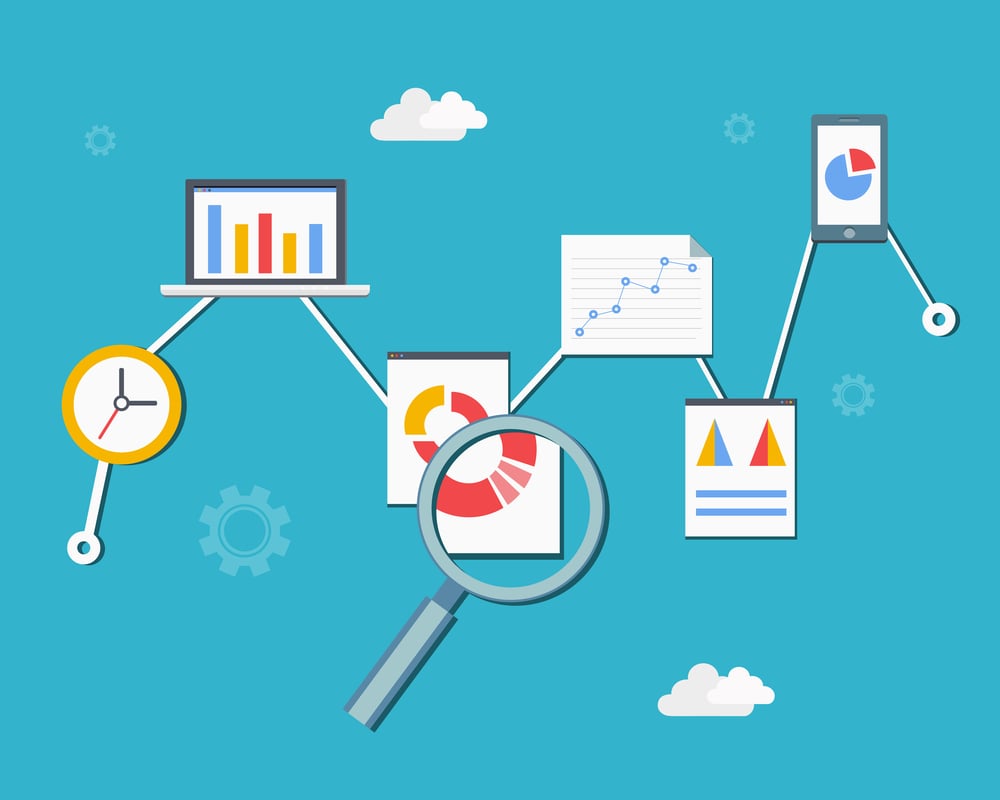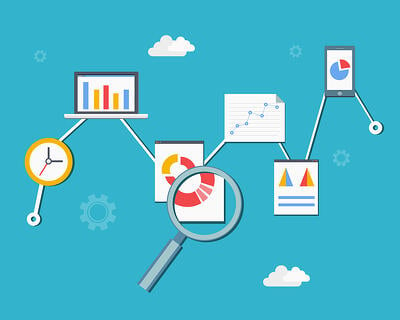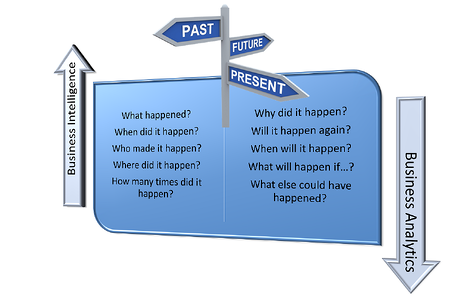Analytics Innovation Big Data Information Management
Why Everbody is Talking Analytics but Nobody is Doing it?

Undoubtedly you already heard about the strategic and competitive advantages Business Analytics can deliver by bringing you wisdom and insights derived from your company data.
“Analytics is like teenage sex: everyone talks about it, nobody really knows how to do it, everyone thinks everyone else is doing it, so everyone claims they are doing it…”
But is this really the case? Is Analytics really worthwhile talking about? And more importantly, how can companies go from just talking about it to actually and successfully doing it?
Scientia Potentia Est
Almost every company has long recognized the importance of well-founded decision support, based on facts and figures. Knowledge is Power. The definition of Key Performance Indicators, the use of frameworks like the Balanced Scorecard and Dashboards have become common approaches.

The Past, the Present and the Future
Likewise, the Data Warehouse, Online Analytical Processing and Multi-Dimensional Cubes have become the common technologies to efficiently integrate data from different disparate sources to create a central repository of data optimized for reporting. The whole of these approaches is now commonly referred to as Business Intelligence.
The Past and the Present
Typically, traditional Business Intelligence involves factual reporting and trend analysis of past events in support of the decisions we make about the present and the future.
- What was the sales revenue in the first quarter of the year? Is additional sales effort needed to meet our target?
- How many customers did we win/loose in the first half-year? How many did we win/loose in Flanders, how many in Wallonia? How many of the won customers can be attributed to the promotional campaign (e.g. via a recorded promotional code) that was launched in Flanders last month? Was the campaign successful? Should it be repeated in Wallonia? Can it be improved?
The Future has Arrived
In Business Analytics a whole different type of questions can be answered. Rather than reporting on past events we make predictions about future events. Additionally, we try to find explanations of why certain events occurred in the past so that we can learn from it and make better decisions in the future.

Analytics also aims to describe the hidden complex patterns and relationships underlying the data, enabling us to gain new insights and knowledge about our business. Consider the following examples.
- In Customer Segmentation, customers are classified in different groups based on meaningful behavioral criteria far beyond the traditional geographical and demographical criteria. This allows for a better marketing approach and increased opportunities for cross and upselling.
- In Customer Profiling we can go even further by making up profiles of typical customers. E.g. what does a customer who is potentially interested in a particular product typically looks like? To what segment(s) does this customer belong? What is the typical behavior of a customer in this segment?
- In Churn Prediction, individual customers are scored with the likelihood they will end their contract. This makes it possible to proactively undertake action. This is almost always less expensive than the effort to win a new customer.
- Other examples include Market Basket Analysis to predict what products our customers are likely to buy, Credit Card Fraud Detection in banking and Process Analytics to analyse our operational processes.
The Future Looks Bright
Operational Excellence, Direct Marketing, Cross and Upselling, Anti-Fraud Measures,... Indeed, the possibilities are vast and the potential advantages - strategic, competitive or financial - are enormous.
You Talk the Talk but do you Walk the Walk?
So yes, Business Analytics is definitely worth talking about. And that's exactly what everbody is doing. Talking about Analytics. Analytics is a hot topic at different conferences, is subject of countless seminars and Analytics software is flooding the market. I see strategic documents in companies stressing the importance of Analytics and I hear marketeers telling me Analytics is the way to go...
And yet, when I look around me on the Belgian market, I see too little Analytics actually going on. Of course, some things are happening, and there are definitely success stories. But there is still a vast majority of companies in Belgium that are talking the talk but don't succeed to start walking the walk...
I see four gaps companies are struggeling with to bridge, preventing them from actually getting started with Analytics:
- The Knowledge Gap - Multidisciplinarity is Key to Success
- The Technology Gap - There's no such Thing as a Free Lunch
- The Uncertainty Gap - Search for the Unkown
- The Buy-In Gap - Nobody wants to Write a Blank Cheque
The Knowledge Gap - Multidisciplinarity is Key to Success
The single most important reason is without any doubt that companies don't have the competences in house to do so. Analytics is the combination of techniques and ideas taken from different domains like statistics, machine learning, algorithms and databases. It requires strong analytical skills in combination with business insight and creativity.
So, start learning, grow and look for the necessary competences. One person at the time. The battle for the talents has only just started...
Technology Gap - There's no such Thing as a Free Lunch
On the technology side I see a number of different things happening. The market is being flooded with tools and technology, and everyone is making promises about easy to apply, out-of-the box Analytics that is fast and integrates well. And let us not forget Big Data! You need Big Data to do Analytics don't you? In this jungle of tools, technology and promises it is easy to get lost... Of course I do believe in the importance of good technology, but in the end it is still the way we use the technology that will determine how successful we are. Furthermore, can vendors really live up to their promises? Maybe they can, but at what cost?
So, look for alternatives. There are some very good open source alternatives on the market that can get you started real quickly. The R Project for Statistical Computing is a very nice example of this. Start experimenting. And very soon a good overall technological setup combining data capturing, data storage, data enrichment, data quality and data processing will be needed. Avoid technological chaos.
The Uncertainty Gap - Search for the Unkown
Analytics comes with some degree of uncertainty in a number of different ways. First of all there is the uncertainty of what you will find in your data, if anything at all... We start with the basic assumption that our data contains some underlying patterns and relations that we can find and exploit to our advantage. But will this actually always be the case? Yes it probably will, but often it will be unclear how exactly you have to look for it or where you will find it.
"Analytics is like a quest through your data, down the road you encounter obstacles and gain new insights that lead you to change your path."
Furthermore, once you have found something there will most certainly be some degree of uncertainty in what you have found. Say what? Yes, we are dealing with statistics, probabilities, confidence intervals, etc. Essentially, Analytics is about building statistical models that are generalisations of the real world and thus come at the cost of some degree of correctness... Needless to say that people (and companies likewise) don't cope well with uncertainty.
So, give people the time to get used to these types of models. Make it concrete and tangible. Show the added value by applying the models in a business context.
The Buy-In Gap - Nobody wants to Write a Blank Cheque
Having said the above it may not be difficult to see that getting started with Analytics is not something that can be taken for granted despite the possible advantages it can bring. After all, it will take time to acquire the knowledge, you have to invest in the people and the technology to get it done but in the end it is uncertain what -if anything- you get in return. But there is more... Companies are uncertain how they have to embed Analytics into daily operations. What is the impact on the business processes? Are there any legal implications? Will people embrace this new technology, will they be sceptical or maybe even feel threatened?
So, think big but start small. Iterate and improve incrementally. Involve the business and go for early succeses, show added value and gain trust. If you do it right, they will be more than happy to be part of the analytics team!
The First Time Right Syndrome
In the above I gave a number of very simple yet powerful tips on how to bridge the four Analytics gaps. I strongly believe that with the right attitude and a company culture of innovation a lot is possible. Following quote summarizes this very well for me.
"We have to get rid of the “first time right” syndrome, dare to do smaller experiments, work iteratively."
Have a look at the blog post I took it from, it tells a story of cost efficient and realistic innovation with the do's, the dont's and lessons learned: "The drama of innovation in 4 acts." (in Dutch). The analogy with the above will become readily clear...
In my next post I will elaborate in more detail on some of the important aspects of the above tips and show you how they can actually help organisations in getting started with Analytics. In the meantime I am looking forward to any thoughts or ideas you may have.





